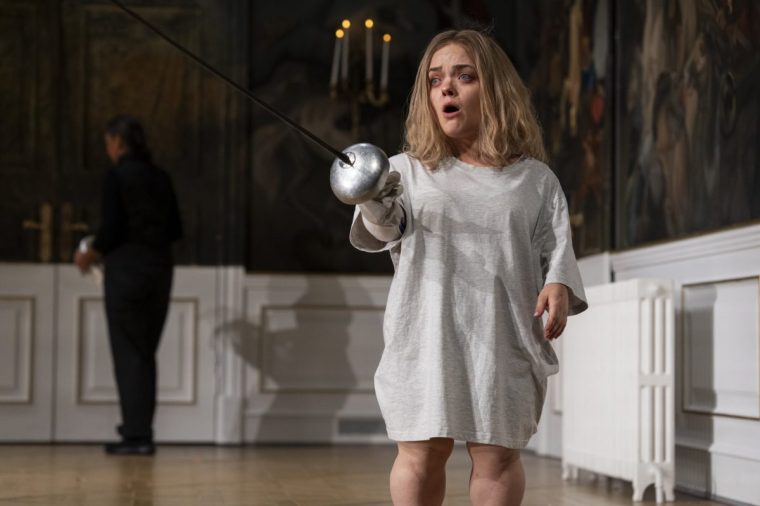Hiran Abeysekera gives his tortured modern prince a manic energy, but races through “to be or not to be” with little depth
Last week, Indhu Rubasingham’s tenure as artistic director of the National Theatre began with her bold and sometimes unsettling production of ancient Greek tragedy The Bacchae. Now comes the turn of her deputy, Robert Hastie, with his take on world theatre’s most famous drama, always a significant moment in any venue’s programming cycle. The vision of this leadership team is stated once again, loudly and clearly: it’s diverse, inclusive and punchily modern, aware of traditions and history but refusing to submit to the notion that there is only one possible way of going about things.
Where Hastie scores most highly is in the sense of hurtling momentum that his slick and sinuous production creates, clocking in at an unusually brisk two and three-quarter hours. To achieve this, there are minimal scene changes, meaning that the majority of the action unfolds in Ben Stones’s notably elegant grand dining room set, with its walls of beautiful painted murals. Plunged into almost darkness, the jittery opening scene is genuinely terrifying, yet absurdity abounds when Hamlet (Hiran Abeysekera) subsequently meets his father’s ghost in the now fully lit room and the pair sit down for a chat.

Abeysekera, an Olivier Award winner for The Life of Pi, gives his tortured modern prince a manic energy and a smile of deep existential emptiness; there is a sense that his problems started long before his mother Gertrude (Ayesha Dharker) married his uncle Claudius, played by Alistair Petrie with a sense of grim majesty. Thus the mood music Abeysekera’s demeanour suggests is perfect, but the performance is let down by the fact that he takes the soliloquies at an almighty lick, racing through ‘To be or not to be’ with little sense of truth or profundity. This lack of gravitas creeps insidiously outwards to colour everything else, including the Fortinbras strand.
Hastie offers us the Polonius family as an intriguingly spirited trio and so much do we enjoy the initial dynamic between Polonius (Geoffrey Streatfeild, superb) and his adult children Laertes (Tom Glenister) and Ophelia (Francesca Mills) that we long for a few offshoot episodes of this family dramedy. Mills’s Ophelia is cheeky and confident, a joyous breath of fresh air in the stuffy Danish court; it is wrenching to see how this spirited young woman is crushed by the machinations of power. Rosencrantz and Guildenstern resemble slightly vampiric extras from Hogwarts, whereas the players appear to have been studying the starkly stripped-back style of director Jamie Lloyd.
The production fails to supply quite enough heft fully to anchor the grim finale, even though Abeysekera and Glenister manage a touching moment of reconciliation, as they realise that they have both, to a large extent, been pawns in someone else’s warped game.
To 22 November, National Theatre, London (020 3989 5455, nationaltheatre.org.uk)
